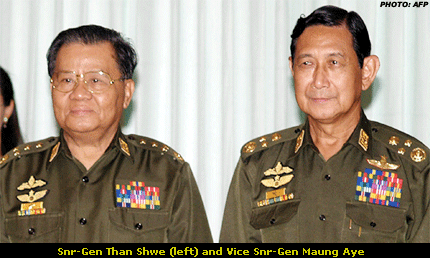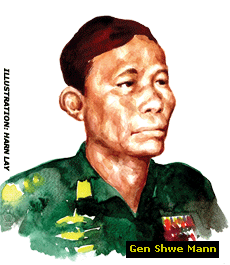
| By AUNG ZAW | JULY, 2006 - VOLUME 14 NO.7 |
Unlike former Burmese strongman Ne Win, junta boss Snr-Gen Than Shwe believes in hanging on to his top military post, along with his colleagues. That belies the armed forces’ claim that it is being rejuvenated
Senior officers of

The trouble is these senior generals show little desire to leave their posts, and any ambitious new, younger faces must face this ceiling, even though the generals are staying way past their official retirement age of 60.
Commander of the Tatmadaw, as well as junta boss, Snr-Gen Than Shwe is about 76, though he officially chooses not to disclose his true age. A deeply superstitious man, perhaps he may fear some sort of astrological consequence if he reveals it. His number two man in the regime, and also army commander, Vice Snr-Gen Maung Aye, is now 67. Other senior generals are almost all in their 60s.
Than Shwe became armed forces commander in 1992, and Maung Aye was appointed army commander and deputy commander of defense services in 1993. According to the military’s mandatory retirement age of 60, both should have had to relinquish their posts long ago. But they haven’t.
Than Shwe and Maung Aye are the two remaining members of the ruling council who took power in 1988. Others in the council have either been officially retired or purged. There have been persistent rumors that when Than Shwe and Maung Aye do retire, they will go together. Than Shwe is reliably reported not to trust Maung Aye, and presumably would not want him to retain his army command after he, Than Shwe, has stood down.
Despite relentless rumors recently that he was about to be marginalized, the army commander has kept his position. He even gained credit in army ranks by demoting his brother-in-law, Maj-Gen Maung Maung Swe, from head of the coastal region command, where he was involved in corruption, to the ministry of social welfare, relief and resettlement.
But at the same time, military analysts think that both Than Shwe and Maung Aye are preparing eventually to promote their trusted prot?g?s to lead the Tatmadaw. This has seen young officers, loyal to their respective masters, rising to prominence in the War Office.
One of them is Gen Shwe Mann, a former commander of southwest command, who now has the newly created post of joint chief of staff. His duty is to oversee the bureau of special operations, which makes him the official operations coordinator of the army, navy and air force.
Shwe Mann won a Thura title for courage during a battle against Karen insurgents in the early 1990s. Analysts say that if Shwe Mann is being groomed to succeed Than Shwe as head of the Tatmadaw, he is having to wait a particularly long time. He has been in the defense ministry for more than seven years.
Shwe Mann is from Shwe Kyinn, traditionally a Karen dominated area in Pegu, just north of
Observers in the past predicted that the general was being groomed to fill the shoes of Maung Aye. In a paper published by the Singapore-based
“More importantly, he [Shwe Mann] appears to have the support and confidence of both senior and junior commanders. He is known for his good leadership, both in command and in staff positions,” Maung Aung Myoe wrote.
If Shwe Mann is given a top-ranking command position, he may be the first ethnic Karen to make it so far since 1949. Shortly after
 Some observers may express doubt about whether Shwe Mann, now 59, is heading for the top. But if he is not, is there any alternative candidate? It is a military tradition that top ranking officers, including the Tatmadaw commanders, are normally picked with great care.
Some observers may express doubt about whether Shwe Mann, now 59, is heading for the top. But if he is not, is there any alternative candidate? It is a military tradition that top ranking officers, including the Tatmadaw commanders, are normally picked with great care.
The late strongman Gen Ne Win, chairman of his ruling Burma Socialist Program Party, was head of the armed forces for more than 20 years. But unlike Than Shwe he did not overstay as commander of the Tatmadaw when he reached 60. Yet he continued to wield political and military power, demoting and firing several highly-educated officers, while favoring officers from his own 4th Burma Rifles for promotion.
Ne Win also named his own choice of Gen San Yu as armed forces commander. San Yu, who was then approaching 60, did not stay in the post long. After two years, he was replaced by Gen Tin Oo, who later became chairman of the opposition National League for Democracy, and is now under house arrest.
Tin Oo was also in the top post for only two years, before being forced to quit after being implicated in an abortive coup attempt. His successor Gen Kyaw Htin was also carefully chosen. He was Tatmadaw commander for nine years until Snr-Gen Saw Maung was appointed, holding the post until 1992, when he was forced to retire for “health reasons.” That was when Than Shwe took over—and brought in his new system in which he and other ageing generals cling to their military ranks. In the process, Than Shwe and his ageing colleagues in power have become a bottleneck for those younger officers who have set their sights on top military positions.
As Maung Aung Myoe noted in his working paper, splits along racial lines, organizational origins and political affiliation in the Tatmadaw have been solved. But, as he correctly pointed out, the only problem remaining is succession to the top jobs. Clearly, there is no solution in sight.
Many top generals are beyond the retirement age, and their successors will be from among the regional commanders. When choosing candidates for top posts, loyalty to the Tatmadaw is a paramount consideration, along with professionalism and combat experience. Only battle-hardened officers with field experience make it to the top posts. Above all, a successful contender for armed forces commander must gain respect and support from the ranks. Thus, Shwe Mann may be qualified for the post.
Along with Shwe Mann, several regional commanders in their 50s were chosen for the most senior positions in recent years. They were Lt-Gen Aung Htwe, Lt-Gen Tin Aung Myint Oo, Lt-Gen Thein Sein, Lt-Gen Soe Win and Maj-Gen Sit Maung. Sit Maung died in a helicopter crash in 2001, while Thein Sein is now secretary one, a political position attached to the ruling council. Aung Htwe and Tin Aung Myint Oo are now heads of bureaus of special operations, while Soe Win is prime minister. This could augur well for Shwe Mann to slot into the top job. But nothing is certain in the Burmese military hierarchy.
At the recent military quarterly meeting, observers noted some surprises. One was the promotion of Brig-Gen Myint Hlaing, commander of the northeast command, to head the country’s air defense department, a job previously held by Soe Win. He is considered to be Maung Aye’s prot?g?, and instigated the downfall of former prime minister and military intelligence chief Gen Khin Nyunt in 2004. Khin Nyunt was regarded as Maung Aye’s rival.
But Than Shwe has also placed his men in high places. For instance, former
As for Than Shwe himself, he is unpredictable. While rumored by some observers to want to give up his top military post, he is also reported to have floated the idea of creating a new ruling council, through which he would retain full authority over both political and military affairs—even if he hangs up his uniform.